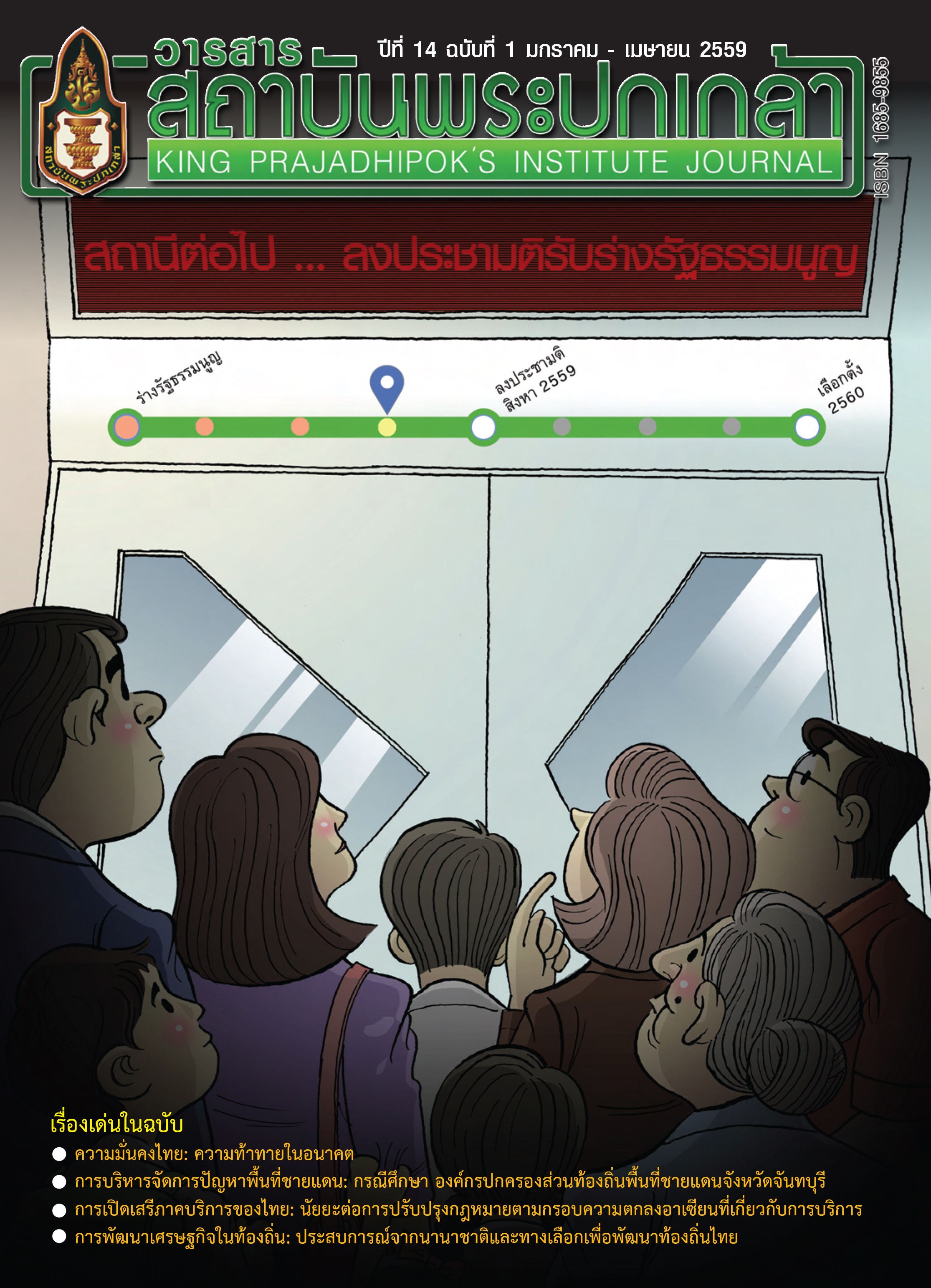Politicians and Power Structure in Samut Prakan Province
Main Article Content
Abstract
This article focuses the dynamic of influence of new and old political elite groups in the changing economic and social conditions in Samut Prakan Province. The study examines 1) economic and social changes in the Samut Prakan Province between 2538 (1995) and 2555 (2012); 2) the changes in the role of the traditional group of politicians in Samut Prakan Province; and 3) the relationship between the economic and social changes in Samut Prakan Province and the emergence of a new group of politicians.
This study use descriptive analysis by focusing on documents and collecting data through in-depth interviews with members of the Assawaheam group and new politicians. The result of the study can be divided into three parts.
In the first part, the study of the economic and social changes in Samut Prakan Province between 2538 (1995) and 2555 (2012) found that the economic and social conditions have developed continuously as indicated by the continuous rise in gross provincial product, the agricultural sector and industrial sector, the expansion of housing, and the increase in population.
In the second part, the study focused the changing role of traditional politicians in the province. The findings showed that after Mr. Wattana Assawaheam, head of the Assawaheam group, lost the 2544 (2001) general election because of corruption cases related to the Klong Dan project, he to the subject land, Klong Dan, since 2544 (2001) make Mr. Wattana Assawaheam lost his political role in Samut Prakan. Although a political role in national politics of the Assawaheam Group is decreased, however, there were still has a role in the local politics.
In the third part, the study focused on the relationship between economic and social changes in Samut Prakan Province and the emergence of new political groups. It was found that new political groups had a political role since the general election in 2544 (2001). This was because the economic and social changes also changed people’s ideas and concepts. People focused on political party policies that were expected to benefit the people. This brought caused high popularity for Thai Rak Thai Party. Thus it led to the emergence of a new political group in Samut Prakan Province.
Article Details
@ 2020 King Prajadhipok's Institute The Government Complex Commemorating All Right Reserved.
References
จุมพล หนิมพานิช. (2548). พัฒนาการทางการเมืองไทย : อำมาตยาธิปไตย ธนาธิปไตย หรือประชาธิปไตย. กรุงเทพฯ: จุฬาลงกรณ์มหาวิทยาลัย.
ถวิลวดี บุรีกุล และ โรเบิร์ต บี. อัลบริตตัน. ค่านิยมประชาธิปไตย วัฒนธรรมการเมือง และพฤติกรรมการเลือกตั้งในประเทศไทย. นำเสนอในการประชุมวิชาการสถาบันพระปกเกล้า. พฤศจิกายน 2550 กรุงเทพฯ.
ธวัชชัย กฤติยาภิชาตกุล. (2541). การสร้างทายาททางการเมืองของตระกูลการเมืองไทย. รัฐศาสตรมหาบัณฑิต, บัณฑิตวิทยาลัย. จุฬาลงกรณ์มหาวิทยาลัย.
บูฆอรี ยีหมะ. (2552). ความรู้เบื้องต้นทางรัฐศาสตร์. พิมพ์ครั้งที่ 2. กรุงเทพฯ: โรงพิมพ์แห่งจุฬาลงกรณ์มหาวิทยาลัย.
ประกาศศักดิ์ ธานินพงศ์. (2528). นักธุรกิจกับการเมือง : การศึกษาทัศนคติเกี่ยวกับการมีส่วนร่วมทางการเมือง. บัณฑิตวิทยาลัย. จุฬาลงกรณ์มหาวิทยาลัย.
ผาสุก พงษ์ไพจิตร และสังศิต พิริยะรังสรรค์. (2535). รัฐ ทุน เจ้าพ่อท้องถิ่น กับสังคมไทย. เชียงใหม่: ศูนย์ศึกษาเศรษฐศาสตร์การเมือง คณะเศรษฐศาสตร์ จุฬาลงกรณ์มหาวิทยาลัย.
พรชัย เทพปัญญา และคณะ. (2548). รายงานการวิจัยโครงการสำรวจเพื่อประมวลข้อมูลนักการเมืองถิ่น: จังหวัดสมุทรปราการ. กรุงเทพฯ: สถาบันพระปกเกล้า.
เพียรฤดี ธีรพรสกุล. (2547). ธุรกิจการเมืองกับการควบคุมสื่อมวลชน : ศึกษากรณีสถานีโทรทัศน์ไอทีวี. รัฐศาสตรมหาบัณฑิต, บัณฑิตวิทยาลัย. จุฬาลงกรณ์มหาวิทยาลัย.
เมธี ปรีชา. (2542). บทบาททางการเมืองของกลุ่มปากน้ำ. รัฐศาสตรมหาบัณฑิต, บัณฑิตวิทยาลัย. จุฬาลงกรณ์มหาวิทยาลัย.
วิทยา นภาศิริกุลกิจ และ สุรพล ราชภัณฑารักษ์. (2539). พรรคการเมืองและกลุ่มผลประโยชน์. พิมพ์ครั้งที่ 8. กรุงเทพฯ: สำนักพิมพ์มหาวิทยาลัยรามคำแหง.
วรวุฒิ จำลองนาค. (2548) ความสัมพันธ์ระหว่างรัฐกับกลุ่มทุนผูกขาดในบริบทเศรษฐกิจการเมืองไทย. รัฐศาสตรมหาบัณฑิต, บัณฑิตวิทยาลัย. จุฬาลงกรณ์มหาวิทยาลัย.
เวียงรัฐ เนติโพธิ์. (2546). “เจ้าพ่ออุปถัมภ์กับรัฐอุปถัมภ์.” วารสารสังคมศาสตร์ 43(1): 444-456.
สุพรรณี เกลื่อนกลาด. (2549). กลุ่มผลประโยชน์กับองค์กรปกครองส่วนท้องถิ่น : กรณีศึกษา 4 เทศบาลนครในภาคตะวันออกเฉียงเหนือ. ศิลปศาสตรมหาบัณฑิต, จุฬาลงกรณ์มหาวิทยาลัย.
อัครวัฒน์ อัศวเหม. รองนายกองค์การบริหารส่วนจังหวัดสมุทรปราการ. สัมภาษณ์, 7 มกราคม 2558.
ประชา ประสพดี. อดีตสมาชิกสภาผู้แทนราษฎรจังหวัดสมุทรปราการ. สัมภาษณ์, 21 มกราคม 2558.
เรวดี รัศมิทัต. อดีตสมาชิกสภาผู้แทนราษฎรจังหวัดสมุทรปราการ. สัมภาษณ์, 13 มกราคม 2558.
การเลือกตั้งสมาชิกสภาผู้แทนราษฎร. การเลือกตั้งสมาชิกสภาผู้แทนราษฎรเป็นการทั่วไป เมื่อวันที่ 6 กุมภาพันธ์ 2548 [ออนไลน์]. สำนักงานคณะกรรมการการเลือกตั้ง จังหวัดสมุทรปราการ. สืบค้นจาก http://www.ect.go.th/th/wp-content/uploads/2013/10/mp48.pdf [8 มกราคม 2558].
การเลือกตั้งสมาชิกสภาผู้แทนราษฎร. การเลือกตั้งสมาชิกสภาผู้แทนราษฎรเป็นการทั่วไป เมื่อวันที่ 3 กรกฎาคม 2554 [ออนไลน์]. สำนักงานคณะกรรมการการเลือกตั้ง จังหวัดสมุทรปราการ. สืบค้นจาก http://www.ect.go.th/th/wp-content/uploads/2013/10/mp_54.pdf [8 มกราคม 2558].
ท่าอากาศยานสุวรรณภูมิ. [ออนไลน์]. วิสัยทัศน์. สืบค้นจาก http://www.suvarnabhumiairport.com/th/177-vision. [8 มีนาคม 2557].
ภูมิภาค-ชุมชนเมือง : ข่าวทั่วไป. เก็บเงินภาษีสนามบินได้ใช้พัฒนาเต็มที่แบบก้าวกระโดด [ออนไลน์]. คมชัดลึก, 2557. สืบค้นจาก http://www.komchadluek.net/detail/20140812/189946.html [12 ตุลาคม2557].


